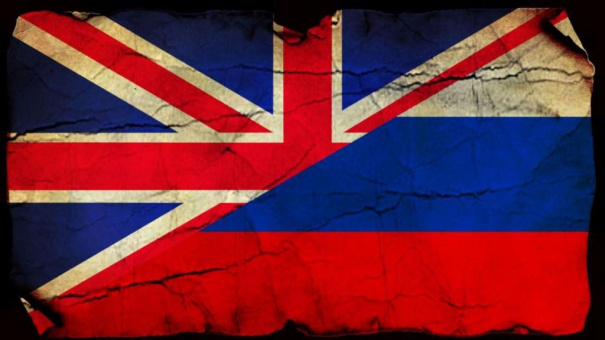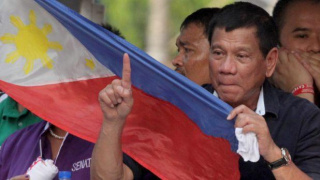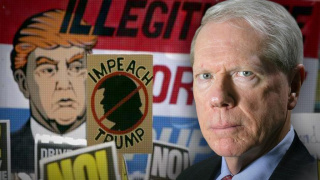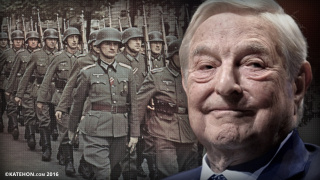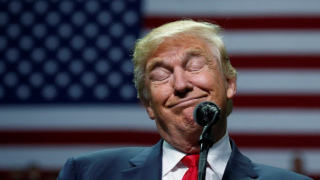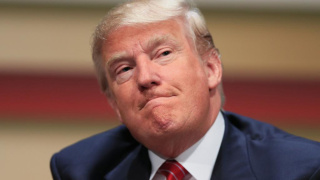Russia and Britain: An Enduring But Fruitless Rivalry
27.03.2018
The ongoing crisis between Britain and the Russian Federation over the poisoning of a former GRU colonel on British soil is the latest episode in what for a number of years has effectively been a ‘Cold War’ between Russia on the one hand, and the Western alliance nations comprised of Nato and the European Union on the other. It is important, nonetheless, to note that friction and dissonance between Russia and Britain has been an enduring one spanning the centuries. It is a rivalry that has been predicated on cultural differences, ideological antagonism and imperial ambition. It can in many ways be argued to be in essence a recurring clash of civilisations which today is fixated on the attempts of the Anglo-Saxon powers and their Western allies to maintain their global military and economic domination in the face of a surgent Eurasia at the centre of which is Russia. But with the ideological Cold War with the old Soviet Union long ended, a crucial question that continues to elude discussion concerns the efficacy of Britain’s prolongation of a ‘rivalry’ with a faraway Eurasian power.
Culture
“All shall serve the state
Only a strong ruler can save Russia
Only strong rule and a united state can repel the enemies at our borders”.
- Words of Ivan the Terrible at his coronation in the Kremlin in Sergey Eisenstein’s 1944 film about the first Tsar of Russia.
A useful starting point would be to emphasise the historical distinctions between Russian and British conceptions of the state as well as the perceptions held by the respective populaces of the role of the state. While the origins of both the British and Russian states are rooted in the autocratic rule of monarchs, the concept of state in feudal England arguably never bore the hallmarks of the sort of absolutism that developed in Russia where the equivalent term for state, gosudarstvo, connoted a sovereign who ruled with unfettered and unaccountable power.
The English innovation of a law-governed state that continued to evolve after Magna Carta contrasted with the iron-fisted rule,zheleznaya ruka, that is the legacy of Russia having been submerged by centuries of Mongol occupation. Writing when he held the position of British Ambassador to Russia at the time of Ivan the Terrible, Giles Fletcher’s astonishment at the unchecked power of the Tsar is evident:
The form of government is plainly tyrannical. All are beholden to the Prince (Tsar) in the most barbarous manner. In all matters of state: making and annulling public laws, making magistrates, the power to execute or pardon life. All pertain absolutely to the emperor as he may both be commander and executioner of all.
Where Anglo-Norman constitutionalism progressively developed, the vestiges of consultative government of the sort practised by Kievan Rus and Novgorod became lost to Russia during a tumultuous history. If, for argument sake, there is truth to the allegations of state-sponsored assassinations of opposition politicians and journalists as well as traitorous figures in the field of intelligence under the rule of President Vladimir Putin, then some will argue that in the Russian psyche the individual consciously subordinates himself to the state and understands that he is liable to forfeit his life to the state in a manner that is incomprehensible to the average Briton. This applies equally to those who sacrifice themselves for Mother Russia, as in the case of Prince Igor’s doomed expedition against the Polovtsians, as well as those who either speak out against an incumbent head of state or who otherwise betray the state.
Thus it is not difficult to fathom why, regardless of the deliberately contrived anti-Russian sentiment by the Western media, many could rationally believe that Putin, a former official of the KGB, who is perceived in the West as a strongman-ruler in the mould of an oriental despot, could be responsible for the targeting of figures such as Anna Politkovskaya and Alexander Litvinenko.
Imperial Ambition
“To those socialists and pacifists I say, ‘Would you betray the courage of the gallant fallen by abandoning our imperial borders to the possibility of future aggression intrigues of the Russians?”
- Winston Churchill, ‘The Riddle of the Frontier’.
It is important to recall the rivalry between the British and Russian empires during the 19th century because there are parallels with the present day confrontation between the West and Russia. The Bolshaya Igra or ‘Great Game’, a term popularised by the English writer Rudyard Kipling, describes the competition between both empires for spheres of influence in Central Asia.
In January 1830, an edict issued by Baron Rupert Ellenborough, the governor of British India, established a new trade route from India to Bukhara (part of modern Uzbekistan) via Turkey, Persia and Afghanistan. It had the objective of keeping in check any advance of Russia towards the warm-water sea ports of the Persian Gulf. This stood in opposition to the Russian aim of turning Afghanistan into a neutral zone through which it could secure access to key trade routes.
A series of military confrontations ensued: The first Anglo-Afghan War from 1839 to 1842, the first Anglo-Sikh War from 1845 to 1846, the second Anglo-Sikh War from 1848 to 1849 and the second Anglo-Afghan War from 1878 to 1880. British success in these wars was limited while the Russians succeeded in colonising several central Asian Khanates including the much prized Bukhara. Nonetheless, the British managed to keep Afghanistan as a buffer between Russia and India.
The ‘Great Game’ came to an end with the signing of the Anglo-Russian Convention of 1907 which delineated mutual spheres of influence in Persia. Both sides agreed to refrain from intervening in Tibet and Russia acknowledged British influence in Afghanistan.
Ideology
“From Stettin in the Baltic to Trieste in the Adriatic, an iron curtain has descended across the continent”.
- Winston Churchill speaking in 1946 at Westminster College, Fulton, Missouri.
Britain and Russia became allies against Kaiser-era Germany in the First World War and Britain and the Soviet Union would be allied in the effort to defeat Nazi Germany in the Second World War. But such were the differences in ideological outlook between the Western allies and the Soviet Union that a ‘Cold War’ ensued with Britain becoming a part of the North Atlantic Treaty Organisation (Nato), a military alliance that was confronted by the Soviet-led Warsaw Pact.
Winston Churchill, who coined the phrase ‘Iron Curtain’, had as the war secretary overseen the British-led foreign invasion of Russia via Archangel, a move which he saw as an opportunity to strangle Bolshevism “in its cradle”. That military action, as had the Crimean War in the 19th Century in which Britain had allied with France, contributed to the age-long Russian fear of foreign attacks. The British Secret Intelligence Service was also involved in intrigues geared towards overthrowing the Bolshevik regime which had signed an accord with the Germany enemy and through the efforts of Robert Bruce Lockhart, although ostensibly working for the Foreign Office, were almost certainly involved in a plot to assassinate leaders such as Lenin and Trotsky.
The post-war confrontation with the Soviet Union lasted for much of the second half of the twentieth century. While the issues of a nuclear arms race and proxy wars were significant factors in the rivalry between the West and the Soviets, the intelligence war remains a hugely emblematic feature of the era replete with intrigues of espionage during which British intelligence often tangled with their Soviet counterparts.
Soviet intelligence had great success in penetrating Britain’s domestic and foreign intelligence services, as the defections of Guy Burgess, Donald MacLean and Kim Philby spectacularly revealed.
There was also a gruesome episode where the Soviets disrupted a British attempt to spy on a Russian naval cruiser, the ‘Ordzhonikidze’, which was berthed at Portsmouth Dockyard during a 1956 visit to Britain by the Soviet leader Nikita Khrushchev. MI6, the Secret Intelligence Service, recruited Commander Lionel ‘Buster’ Crabb, a retired naval frogman to reconnoitre the ship on a spying mission which was done without the knowledge or the permission of Prime Minister Harold MacMillan. It ended disastrously. Crabb disappeared and a body purported to be his was found by fisherman a year later decapitated and shorn of its hands.
But the British intelligence services did have their successes. The recruitment of Oleg Penkovsky, the GRU colonel who provided valuable information used by the United States during the Cuban Missile Crisis of 1962, was undertaken by MI6. MI6’s ‘turning’ of Oleg Gordievsky, a KGB agent who was later appointed the London station chief, also counted as a triumph as did its exfiltration of Gordievsky from Russia after he had been recalled home and interrogated as a suspected double agent.
An overall assessment of the degree to which intelligence made a difference in the ‘Cold War’ is difficult because it ultimately did not break out into an all out war after which the strength and accuracy of intelligence related to the other side’s intentions and capabilities could be validated - if at all. For while Britain and the Soviet Union performed excellently in the field of intelligence during the Second World War, a highlight of the former been its breaking of the German enigma code and the latter, SMERSH’s outmanoeuvering of the German Abwehr on the eastern front, an outbreak of all out war between forces of Nato and the Warsaw Pact would have resulted in the mutual annihilation of both sides.
The Cold War in Fiction
“Dear God you’ve no idea have you! People in this business; they’re not noble warriors, saints and martyrs. They don’t sit in London like monks renouncing Satan and Lenin both. There are a procession of fools and chancers, pansies, cowards, daredevils, drunkards and some of them are brilliant. They don’t do it for peace and freedom; they do it for the game.” - Alex Leamas in John le Carre’s ‘The Spy Who came in from the Cold’.
The fiction of the British writers Ian Fleming and John le Carre played a huge part in mythologising this ‘Great Game’ of intelligence. In the case of the former, the James Bond novels consistently sought to portray Britain, whose power was greatly diminished in the post-war period, as a vital cog in the efforts of the American-led ‘free’ West to counter the threat of the spread of Soviet-inspired communism. But where the reduction in power and prestige remained unmentioned in Fleming books, le Carre’s early works frequently reference Britain’s rationale for seeking to compete with the Soviet Union. This relates to a yearning on the part of the British for the pre-war period of imperial grandeur. It also offers a measure of insight into the reason why Britain has continued to pursue a rivalry with Russia after the end of this ideologically-based conflict.
The Soviets were, of course, depicted as villains in Fleming’s books and the Russians, specifically imbued with unenviable characteristics. In You Only Live Twice, a character warns Bond who is suffering from amnesia to be careful about a proposed expedition to Vladivostok because the Russians “are not a friendly people”.
It seems quite possible to argue that the image of Russia never recovered from the negative portrayals of Western political propaganda and popular culture during this era. Indeed, right at its outset, Stalin had not only denounced Churchill’s ‘Iron Curtain’ speech as “war mongering”, but also interpreted his reference to the “English-speaking world” as imperialist “racism”.
In contrast to the glamour and moral certainties of the Fleming books are the works of John le Carre who’s gritty and morally ambiguous renditions bore the ring of authenticity. The spy games played out in an ideological war between capitalist states and communist states took on undertones that did not reflect the notions propagated in the West of a straightforward morality play of the ‘good’ West versus the ‘bad’ East.
Espionage on both sides was an endeavour shrouded in a great deal of ugliness. In his most famous book, The Spy Who Came in from the Cold, ‘Control’, the fictional head of British intelligence admits that both sides essentially employ the same methods when stating that “you can’t be less ruthless than the opposition simply because your government’s policy is benevolent, can you now?”
In several ways, the book portrays British intelligence as been even more ruthless and amoral than the rival secret services of the Soviet bloc. Le Carre was a former intelligence officer with firsthand experience of the intelligence war and this acknowledgement that the British play the game of covert operations as dirty as anyone else should be borne in mind when considering what misdeeds the British and Russian secret services are each capable of accomplishing.
As a character in one of his later books, The Little Drummer Girlexplains: “Terror is theatre … Theatre’s a con trick. Do you know what that means? Con trick? You’ve been deceived.”
Anglo-American Hegemony and the Threat of Eurasia
Who rules East Europe commands the Heartland;
Who rules the Heartland commands the World-Island;
Who rules the World-Island controls the world.
- Halford Mackinder, Democratic Ideals and Reality (1919).
Russia sits at the heart of a contiguous land mass encompassing Europe and Asia. In 1904, a British geographer and scholar named Halford Mackinder, postulated the ‘Heartland Theory’ in a paper he titled The Geographical Pivot of History. This is a geostrategic theory which divides the world into three geographical regions. The Americas and Australia were referred to as “outlying islands” and the British Isles and the islands of Japan he labelled “outer islands”. The combination of Africa, Europe and Asia he termed the “World-Island”. And at the centre of the “World-Island” is the “Heartland”, which stretches from the Volga River to the Yangtze River and from the Himalayas to the Arctic Ocean.
Later in 1919, Mackinder summarised the essence of his theory as follows: Who rules East Europe commands the Heartland; who rules the Heartland commands the World-Island; who rules the World-Island commands the world.” It served as both a warning and a suggestion. It warned that sea power which had seen the rise of Western European powers and the United States would give way to land power and it suggested that controlling Eastern Europe would serve as the means through which the Heartland’s power could be balanced.
The modifications offered to Mackinder’s thesis by other theorists do not diminish the importance of Russia in any calculations related to the geopolitical balance of power and this is borne out by the policies of Britain and other Western nations in the past as well as the present. Russia is after all located at the centre, the Eurasian core which Mackinder named the “Pivot Area”.
The British Empire, sometimes in concert with other powers such as France and the Ottomans in relation to Crimea, fought the Russian Empire as a means of preventing its expansion southwards. The aim of containing Russia was thus an extension of Britain’s ‘balance of power’ foreign policy doctrine which informed its relations with continental Europe. This was also the rationale behind the alliance first with the Russian Empire as part of the ‘Triple Entente’ against Austria-Hungary prior to the First World War and secondly with the Soviet Union against Nazi Germany.
Britain’s empire of course rapidly dissolved after the Second World War, and so it is not quite accurate to refer to it as having been a rival to the Soviet Union and now Russia. But it remains an important part of the Western alliance led by the United States. Mackinder’s ideas helped shape the West’s management of the ‘Cold War’ and his influence is strong in the foreign policy America has conducted since the ending of the Cold War.
It is important in this context therefore to consider the thinking that has informed American global foreign policy which Britain has slavishly supported. The Brzezinski doctrine is derived from an explicit formulation by Zbigniew Brzezinski in his 1988 book, The Grand Chessboard, which theorised a formula that was fixated on preventing the rise of a Eurasian power or combination of powers which could challenge the global dominance of the United States. The idea was that the United States needed to militarily intimidate Russia while working to dismantle it for the purpose of using it as a pliant source of Western energy needs.
It is a theory that is in accord with the neoconservative philosophy which has been consistently influential on the policies of successive American administrations dating back to that of President Bill Clinton. Brzezinski’s analysis devoted a great deal to geostrategy in Central Asia which of course was the centre of conflict between British and Russian Empires during the ‘Great Game’.
The end of the Cold War was thought by some intellectuals such as Francis Fukuyama to have represented the ‘end of history’, and, by implication, the end of geopolitics. But the neoconservatives and those imbued with a belief in the messianic aspect of ‘American Exceptionalism’ saw in this historical ‘victory’ of liberal democracy and the free market an opportunity for the United States to impose its will on the rest of humanity. Thus the Wolfowitz doctrine asserted the right of the United States to enforce a global American imperium -even at the cost of abrogating on multilateral agreements- in order to assure the continued political and economic hegemony of the United States.
The result was the inauguration of a new age of American militarism which has been supported and embraced to Britain. Thus Britain, under the aegis of the United States-led Nato alliance, supported American interventions in the Balkans, Afghanistan and Iraq. Britain also joined with France and the United States in toppling the government of Colonel Muammar Gaddafi of Libya.
Further, Britain has supported covert operations overseen by American intelligence agencies that have threatened Russia’s security interests. The effort begun in 2011 to attempt to overthrow the secular government of Bashar al Assad in Syria, where Russia has a longstanding naval base, was based on a plan of infiltrating the country with jihadists. Britain through Nato and the EU supported a United States instigated coup d’état in Ukraine which overthrew the democratically elected government of Viktor Yanukovych and installed a Russophobic, ultra-nationalist regime which threatened to eject Russia’s Black Sea fleet from its base at Sevastopol on the Crimean Peninsula.
While Britain and the West has sought to portray Russia under Vladimir Putin as revanchist, that is, as an aggressive power intent on restoring the former glory of the Soviet Union including the reacquisition of old territories, the truth is that Russian foreign manoeuvres have been reactive rather than proactive.
The Russian incursion into Georgia was a reaction to a Georgian attack on South Ossetia which had been encouraged by Nato. Russia later withdrew it forces. Russia’s reacquisition of Crimea following a referendum came after a United States-sponsored coup carried out by ultranationalist and neo-Nazi groups which caused fear and concern among the Russian-speaking population in the eastern part of the country. Russian troops were already in Crimea under a post-Soviet agreement and there was no invasion of the Ukraine despite calls from Russian ultranationalists for Putin invade and annexe the eastern part of the country.
Russian military involvement in Syria was a reaction to Nato’s support for the infiltration of Syria by Islamic fanatics who were to be used to overthrow the secular Baathist government. Britain has supported this endeavour as evidenced by the revelations of Roland Dumas, the former foreign minister of France, who claimed in 2013 that while on a visit to England a few years before, he had been informed of a plan to overthrow the Syrian government. British military officers were among Nato officials stationed on Syria’s border with Jordan in order offer training to Syrian rebels. Furthermore, in 2015 the Old Bailey trial of a man charged with terrorist activities in Syria collapsed on the grounds that Britain’s security and intelligence services would have been “deeply embarrassed” about their covert support of anti-Assad militias. The fall of Syria would have provided a launch pad for the jihadists to foment trouble in the Muslim areas of the Russian Federation.
Russia’s decision to reorganise its military districts and its battle offensive capabilities including developing a new generation of nuclear weapons can also be considered to be reactive rather than as part of a policy of aggression. This is because it is arguably a development stemming from the decision of the United States to withdraw from the Anti-Ballistic Missile Treaty back in 2002. It is also arguably a reactive episode based on the expansion of Nato to its borders, in contravention of an agreement reached by the leaders of the West and the Soviet Union that Nato would not move an inch eastward in return for consenting to the reunification of Germany as a part of Nato.
While Putin may have declared in 2005 that the collapse of the Soviet Union was the “greatest geopolitical catastrophe of the century”, his statement cannot be definitively taken to reflect a lust to reacquire Soviet borders. Context is important. Putin took over the presidency of Russia, a vast nation that had endured the complete collapse of state authority twice in the twentieth century, after the retirement of Boris Yeltsin, a weak and ineffectual leader who presided over the chaotic and traumatic transformation from a planned economy to a Western free market economy. This period saw the rise of the oligarchs and the wholesale plunder of Russia’s wealth during a structural adjustment programme overseen by Western economic advisors. The Russian death rate increased, living standards decreased and an aura of general insecurity was prevalent. Putin is credited with bringing this state of affairs -comparable in the Russian psyche to the Smutnoe Vremya or ‘Time of Troubles’- to an end.
An understanding of this background is thus important in comprehending the state of animus existing today between Britain and its Western allies on the one hand and Russia on the other. The West is comfortable with a weakened, and even prostrate Russia; a Russia which can be manipulated and exploited, not one which is stable and possessing the potentialities associated with a powerful Eurasian entity. A united and stable Russia which refuses to submit to the hegemony of the West presents an existential threat to continued Western domination.
This sentiment is explicitly expressed by Michael Fallon, a former British minister of defence who in a speech in February 2017 entitled ‘Coping with Russia’, said: “Our hope was to have a partnership with Russia that recognised nations’ pursuit of their self-interest within the framework of the rules-based international order. But Russia has chosen to become a strategic competitor of the West”.
Whereas the West has consistently ignored a ‘rules-based’ approach to international affairs, demonstrated by the destruction -with key British assistance- wrought by invasions and fomented conflicts in locations such as Afghanistan, Iraq and Libya, Russia’s actions have been reactive. Its decision to enter into the Syrian conflict at the invitation of the legal government of that nation, an action which reintroduced multipolarity into the geopolitical arena, has been welcomed by many. In assisting the Syrian Army, Iran and Hezbollah in destroying Western-sponsored Islamist groups, Russia, in the words of Britain’s former foreign secretary Lord David Owen, has “saved civilisation”.
The Aftermath of the Poisoning of Sergei Skripal
“Frankly, Russia should go away - it should shut up”.
- Gavin Williamson, Britain’s defence secretary, speaking in March 2018.
The poisoning of Sergei Skripal, the former GRU colonel turned MI6 double agent in the English city of Salisbury has plunged Anglo-Russian relations to new depths. The tit-for-tat expulsions of embassy staff are reminiscent of the Cold War era. The immediate reaction by British politicians and much of the mainstream media was to immediately hold the Russian state responsible for the attempted murder of Skripal and his daughter.
But within the atmosphere of strident accusation and vilification, is a litany of unanswered, even troubling questions. Firstly, why would the Russian state feel it necessary to attempt to kill an apparently retired agent who no longer poses a threat to its security? Secondly, why would the assassins choice of weapon, novichok, a nerve agent developed by Russia, be utilised for such a enterprise in the full knowledge that the source of the attack would be traced back to Russia? Thirdly, how were the victims able to survive what has been described as a “military grade nerve agent”? Fourthly, what would Russia stand to gain from such an act so close to the Russian presidential elections and only months away from the World Cup which it will be hosting? Fifthly, why would Russia risk upsetting the established convention associated with spy swaps which entails that such agents are not subject to future reprisals?
The rush to judgement, which has involved abrogating the key tenet of Anglo-Saxon jurisprudence of the presumption of innocence before a finding of guilt is somewhat perplexing. As Jeremy Corbyn, the leader of the opposition Labour Party said: “To rush way ahead of the evidence being gathered by the police, in a fevered parliamentary atmosphere, serves neither justice nor our national security”. Prime Minister Theresa May had been quick to announce to the House of Commons that “there is no alternative conclusion other than the Russian state was culpable for the attempted murder of Mr Skripal and his daughter”.
May’s demand on March 14th that Russia provide an “explanation” within 48 hours, was, argued Sergei Lavrov, Russia’s foreign minister, a violation of the Chemical Weapons Convention. Britain, he insisted was under an obligation to hand over samples of the chemical agent allegedly used in the attack to the Russian side and that a ten day window be given.
There is an argument that Article IX (2) of the convention has not been breached by Britain because the language used in the convention is not of an absolute nature. There is also the claim that as the British government concluded that Russia was “highly likely” responsible for the attack, the provision which refers to “any matter which may cause doubt about compliance” did not apply and that Britain was free to pursue a different way of dealing with the matter.
But these arguments are just that: arguments. While it is true to assert that the convention does not provide an exclusive remedy and that exchange of information would not be practical under circumstances when countries are engaged in full-blown military exchanges, the request of Russia appeared reasonable because both nations are not involved in an all-out war.
Further, it can be argued that reasonable doubt does persist given the fact that the British government has failed to disclose any hard evidence confirming the use of novichok. The novichok programme was centred in Nukus, Uzbekistan -not Russia- where weapons stocks are claimed to have been dismantled and destroyed under supervision of the United States. But even if Russia still has stocks of the nerve agent, as the whistleblowing Russian chemist Vil Mirzayanov alleged, it is not accurate to declare that only Russia is capable of producing the variants of the chemical. Indeed, a book published in 2008 by Mirzayanova entitled State Secrets: An Insider’s Chronicle of the Russian Chemical Weapons Programme, provides the formula associated with the production of novichok. This means that any chemical or pharmaceutical corporation or government agency such as Porton Down, the British government-run scientific research laboratory, are capable of reproducing it.
While it is not beyond the scope of Russia to have committed the attack, some harbour suspicions that it may have been a black operation conducted by British intelligence agents with the motive of discrediting Russia in a campaign that has been actively pursued for over a decade. The allegation made by Andrei Lugovoi, the former FSB agent whom the British authorities claim murdered Alexander Litvinenko that the Skripal incident was another “provocation by British intelligence services” will not impress the many who are aware of the historical record of generations of Soviet and Russian intelligence agencies.
But Ray McGovern, a former long-serving CIA officer who received the Intelligence Commendation Medal is on record as not ruling out the possibility of an operation carried out by either Britain’s Security Service or Secret Intelligence Service. Britain’s intelligence agencies have after all been claimed to have been involved in plots of assassination against world leaders ranging from Vladimir Lenin to Muammar Gaddafi and Slobadan Milosevic.
There will be those who will refuse to follow the official narrative because of the lack of evidence and motive on the part of the Russians. Some will go further in asserting their belief that the incident is part of a sinister propaganda exercise. The proximity of Porton Down, to Salisbury, will for some be a source of disquiet. Porton Down has a murky history that includes the use of unwitting individuals and the general public in secret experiments.
Furthermore, it may not be coincidental that a number of attacks made during the Syrian conflict which have involved chemical weapons such as in Ghouta in August 2013 and Idlib in April 2017 came at significant junctures in the conflict where their use happened to provide justification for Western intervention in ways that would debilitate the Syrian government, which of course has been supported by Russia. Blame on each occasion was affixed to the Syrian government in highly disputed circumstances where there was no discernible advantage to be gained by the Syrians in employing their use against Western-backed rebel forces.
The analogy with the Salisbury attack is that Russia, as was the case with the Syrian government, have little to gain, while Britain has the opportunity to take the moral high ground from which to demonise an enemy and discredit an enemy which has won a great deal of goodwill around the world because of its decisive role in defeating Islamist militias in Syria where it has frustrated Western efforts aimed at overthrowing the government of Bashar al Assad.
The underlying question remains: cui bono?
Conclusions
“Even I thought that with the end of the ideological barrier in the form of the Communist Party’s monopoly on power, things would change radically. But it turns out … there are geopolitical interests not linked to ideology at all”.
- Vladimir Putin, speaking in 2015.
The maelstrom of invective and counter-invective related to the fallout over the attempt on the life of Sergei Skripal -one episode within the wider, longstanding state of tension between Russia and the West- tends to obscure one fundamental question: Why does Britain persist in positioning itself as a rival of Russia? It is a question which ought to exercise the mind of any prudent and critical observer.
Both countries do not share a common border. Nor do they have any territorial disputes. And Russia is not seeking to overthrow Britain’s political system, impose an ideology upon it or to conquer it militarily.
Vladimir Putin has consistently expressed the view that since the end of the Cold War Russia has always wanted to foster closer ties with the West, but that this has been consistently rebuffed. It is important to note that Britain’s Secret Intelligence Service turned Sergei Skripal into a double agent in 1995 only a few years after the end of the ideologically-motivated Cold War. This was at a time when Russia was a pliable country undergoing the Western-managed transformation from Soviet socialism into a laissez faire economy.
Espionage directed at another nation state often denotes hostile intent and it is not surprising that Putin amongst many Russians has sensed that the West has sought to break up the country leaving it balkanised in a manner similar to what happened in Yugoslavia.
Britain has certainly worked towards effecting regime change.
In 2006, the Russian authorities revealed an elaborate scheme in which British operatives used a fake rock in Moscow to hide electronic equipment. The FSB linked the item to a British secret service operation involved with making covert payments to pro-democracy and human rights groups - the classic cover used by Western intelligence services, notably the CIA, to foment so-called ‘colour revolutions’. Putin responded by passing legislation restricting non-governmental organisations from obtaining funding from foreign governments.
The perception among many Russians is that these goals indicate that Britain, like rest of the American-led West, has no intention of wanting to treat Russia as equals and only seeks to co-opt Russia into the Western fold on the terms of a subordinate partner.
Since Peter the Great, many Russian leaders and thinkers have gazed westward, seemingly fixated, but at the same time ruefully understanding, as implied by a famous poem by Aleksandr Blok, that such yearning will never be reciprocated. Russia represents the buffer between Europe and the Mongol hordes, is culturally and racially distinct and thus is ultimately unassimilable. And while today the goal of Western assimilation is held by a still influential group sometimes referred to as the ‘Atlantic Integrationists’, the other faction, the ‘Eurasian Sovereignists’, of which Putin is a representative, have been empowered by Western policies which have caused Russia to look eastwards for increased security and economic cooperation with China as well as to other parts of the world.
This meeting of minds between both powers and the policies they have begun to pursue, is to an increasing number of intellectuals the beginning of a geopolitical trend that represents the birth of a Eurasian project, one to which the political and economic destiny of Europeans will increasingly become linked. It is a trend which ought to make Britain re-evaluate its long-term strategy of binding itself with the American goal of maintaining global hegemony. It is a development which arguably reveals the self-defeating element and ultimately the futility of British hostility towards Russia.
Such hostility, represented by an escalating policy of demonisation, is geared towards an inevitable outcome of war between the Western military powers and Russia, a war which some would argue is already in progress. This is presently, for the most part, informational but is also composed of an economic element, the conduct of cyber warfare and is partly kinetic.
A ‘hot war’ with Russia would risk ending life on earth. It is thus incumbent on Britain’s political, intellectual and security leadership to rethink this increasingly fruitless rivalry.
